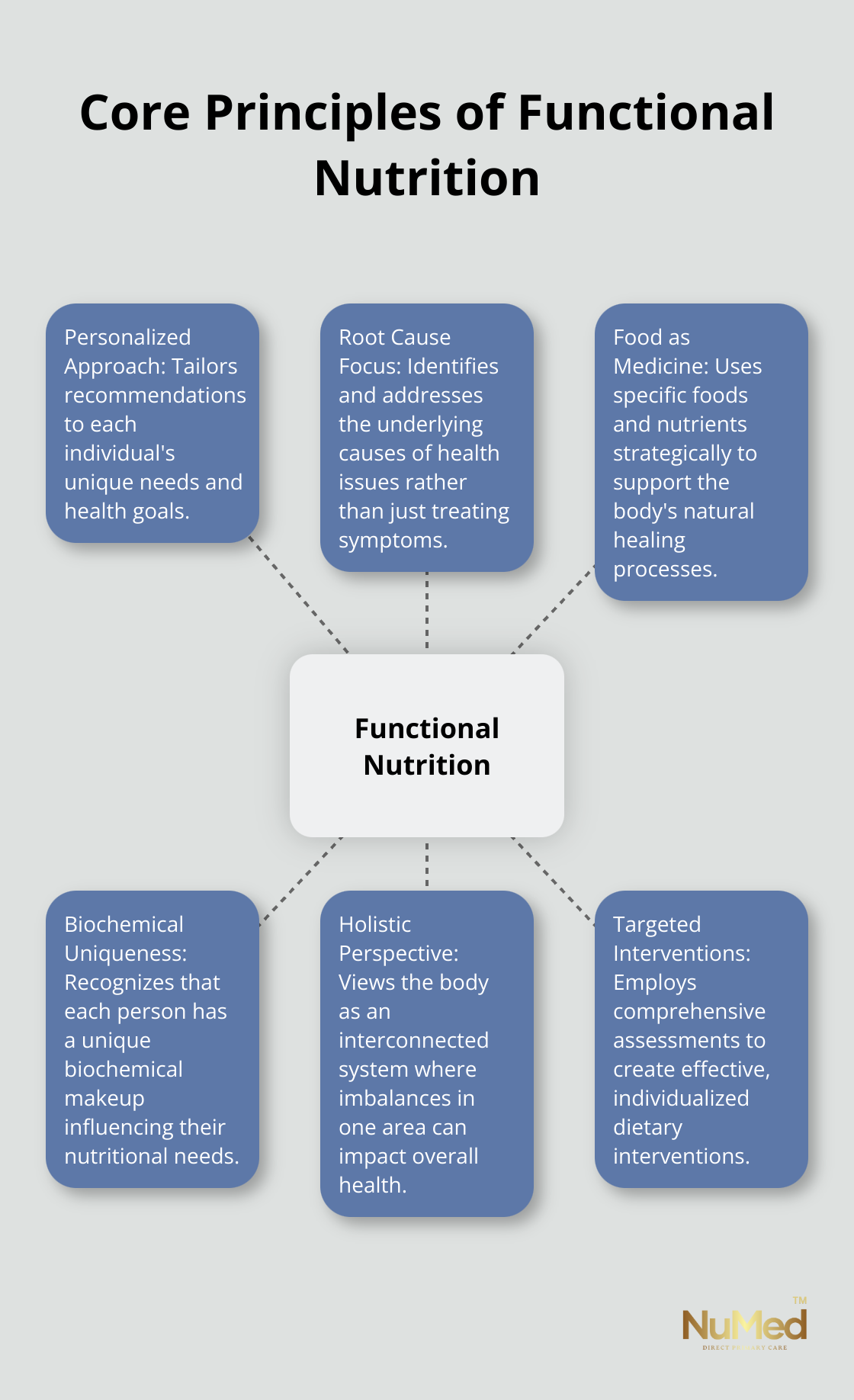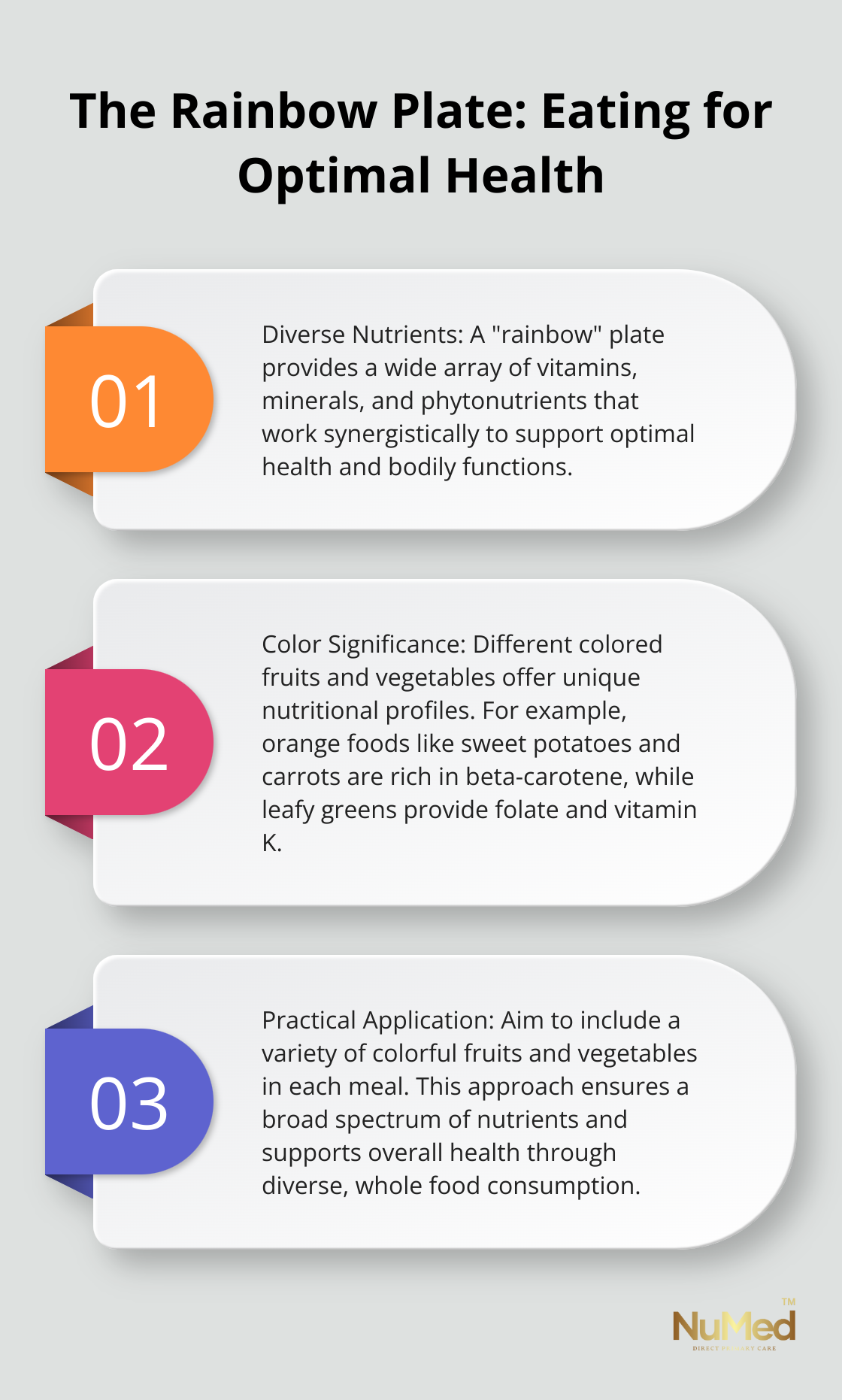At NuMed DPC, we believe in the power of food as medicine. Functional nutrition is a holistic approach that goes beyond conventional dietary advice.
What is functional nutrition? It’s a personalized strategy that uses whole, nutrient-dense foods to address the root causes of health issues and promote overall wellness.
In this post, we’ll explore how functional nutrition can transform your health and provide practical tips for incorporating it into your daily life.
What is Functional Nutrition?
The Principles of Functional Nutrition
Functional nutrition revolutionizes health and wellness by transcending calorie counting and generic dietary guidelines. This approach recognizes food as a powerful healing tool that optimizes our bodies.
At its core, functional nutrition acknowledges each person’s biochemical uniqueness. This principle forms the foundation of functional nutrition practice.

The primary objective of functional nutrition is to identify and address the root causes of health issues, rather than merely treating symptoms. It views the body as an interconnected system where imbalances in one area can impact overall health.
A Personalized Approach
Functional nutrition stands apart from conventional approaches by tailoring recommendations to each individual. It takes into account:
- Genetic predispositions
- Environmental influences
- Lifestyle habits
- Gut health
- Stress levels
- Sleep patterns
This comprehensive perspective enables more targeted and effective dietary interventions. For instance, instead of broadly recommending a low-fat diet for heart health, a functional nutrition approach might involve testing for specific nutrient deficiencies or food sensitivities that could contribute to cardiovascular issues.
Food as Medicine: The Cornerstone
In functional nutrition, food serves as a potent form of medicine. Specific foods and nutrients are strategically used to support the body’s natural healing processes and optimize function.
The Impact on Health
Adopting a functional nutrition approach transforms eating from mere sustenance or weight management to nourishing your body at a cellular level. This strategy supports optimal function and potentially prevents or reverses chronic health conditions.
As we explore the key components of functional nutrition in the next section, you’ll discover how this approach can be tailored to your unique needs and health goals.
How Functional Nutrition Works
Personalized Nutrition Plans
Functional nutrition operates on the principle that food is more than just calories-it’s information for our bodies. This approach creates personalized nutrition plans that address the unique needs of each individual.
The cornerstone of functional nutrition is personalization. It starts with comprehensive assessments, including detailed health histories, genetic testing, and advanced lab work. These assessments identify specific nutritional deficiencies, food sensitivities, and metabolic imbalances that may contribute to health issues.
The Power of Whole Foods
Functional nutrition emphasizes the consumption of whole, nutrient-dense foods. These foods provide a complex array of vitamins, minerals, and phytonutrients that work synergistically to support optimal health.
A practical tip is to try a “rainbow” on your plate at each meal. Different colored fruits and vegetables offer unique nutritional profiles. For instance, orange foods (like sweet potatoes and carrots) are rich in beta-carotene, while leafy greens provide folate and vitamin K.

Addressing Root Causes Through Diet
One of the most powerful aspects of functional nutrition is its ability to address the root causes of health issues. For example, chronic inflammation links to numerous diseases, including heart disease, diabetes, and certain cancers.
An anti-inflammatory diet might benefit patients with conditions like arthritis or autoimmune disorders.
The Gut-Health Connection
The importance of gut health in functional nutrition cannot be overstated. The gut microbiome plays a vital role in digestion, immune function, and even mental health.
Incorporating fermented foods like yogurt, kefir, and sauerkraut can support a healthy gut microbiome.
Functional nutrition serves as a powerful tool to optimize health and address chronic conditions. The next section will explore practical ways to implement these principles in your daily life, helping you take control of your health journey.
Putting Functional Nutrition into Practice
Partnering with a Functional Nutrition Expert
The first step to implement functional nutrition in your daily life involves finding a qualified functional nutrition practitioner. These professionals use food as medicine and create personalized plans tailored to your unique needs. They conduct comprehensive assessments, including detailed health histories and advanced lab work, to identify nutritional deficiencies and imbalances.
Functional Nutrition Protocols in Action
Common functional nutrition interventions often target specific health concerns. An elimination diet might help identify food sensitivities. This protocol removes potential trigger foods for a set period, then slowly reintroduces them while monitoring symptoms.
The anti-inflammatory diet emphasizes foods rich in omega-3 fatty acids (such as fatty fish) and antioxidants found in colorful fruits and vegetables. Studies have shown that diets with higher dietary inflammatory index scores are linked to elevated risks of non-communicable diseases such as cardiovascular disease, cancer, metabolic diseases, and cognitive disorders.
Supercharging Your Diet with Functional Foods
Incorporating functional foods into your diet boosts your nutrition effectively. These foods offer health benefits beyond their basic nutritional value. Examples include:

Whole foods should form the foundation of your diet, but targeted supplementation can fill nutritional gaps. Work with a practitioner to determine which supplements suit you best, as quality and dosage matter significantly.
Lifestyle Factors: The Missing Piece
Functional nutrition extends beyond just what you eat. Lifestyle factors play a vital role in your overall health. Stress management techniques like meditation or yoga can impact your well-being significantly.
Quality sleep represents another critical factor. Try to get 7-9 hours of sleep per night and establish a consistent sleep schedule. Regular physical activity, tailored to your fitness level and health status, complements your nutritional efforts and enhances overall health.
Final Thoughts
Functional nutrition transforms health and wellness by addressing the root causes of health issues. This personalized approach uses food as medicine to optimize bodily functions and prevent chronic conditions. We at NuMed DPC align our practices with functional nutrition principles, focusing on individualized care and comprehensive health assessments.
Functional nutrition empowers individuals to take control of their well-being through targeted dietary interventions. It goes beyond calorie counting, considering factors like genetic predispositions, environmental influences, and lifestyle habits. The question “What is functional nutrition?” leads to a holistic strategy that supports the body’s natural healing processes.
We invite you to experience our holistic approach to healthcare at NuMed DPC. Our team will guide you on your journey to optimal health through the power of functional nutrition and personalized care (tailored to your unique needs). Take the first step towards a healthier, more vibrant you today.
















